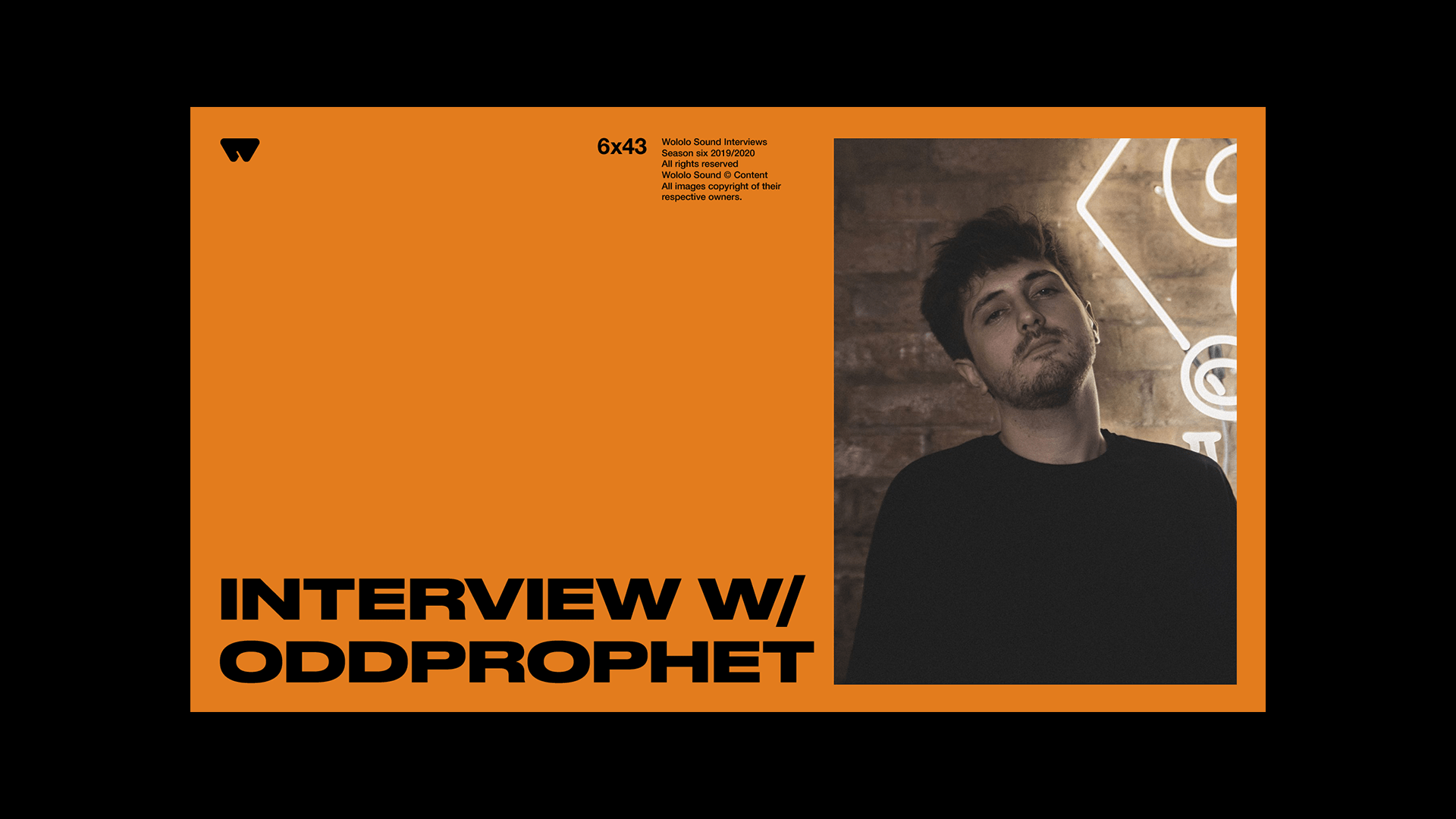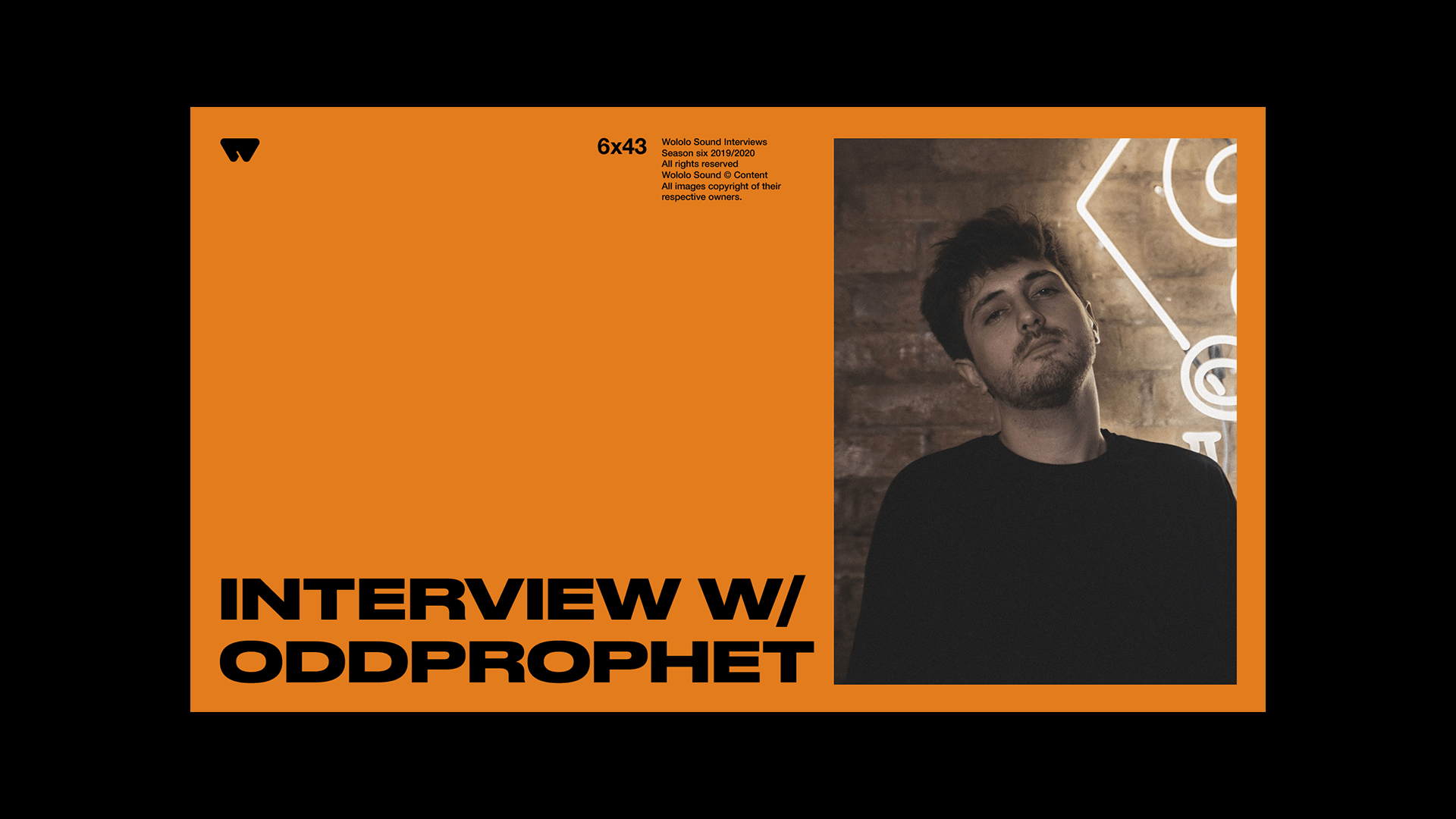Entrevistamos a Oddprophet, el productor galés que conforma una de las figuras del riddim actual y miembro de la Black Label de Never Say Die desde los inicios de su carrera
Tras saltar a la fama hace ya casi tres años y acogido por uno de los sellos más grandes en la industria del género, Oddprophet se ha convertido en uno de los exponentes de riddim más conocidos en la actualidad. En la entrevista de hoy, hablamos con él sobre su carrera, la situación del dubstep actual y la escena que rodea al mismo.

Wololo Sound: Hola Tobias. Lo primero de todo, muchas gracias por dedicarnos algo de tiempo para esta entrevista. Has desarrollado prácticamente toda tu carrera musical en Never Say Die, especialmente en Black Label. ¿Cómo se siente ser parte de la familia y trabajar con ellos? ¿Cómo te ha ayudado esto?
Oddprophet: Siempre he pensado que ser parte de Never Say Die era un sueño imposible cuando empecé a hacer música, pero nunca me he sentido tan como en casa. Trabajar con ellos es como estar en familia. Ellos me han dado la visibilidad que he necesitado y oportunidades que parecen ir a mejor cada año. No puedo echarles nada en cara.
Wololo Sound: Hello Tobias. First of all, thank you for giving us some of your time for this interview. You have developed almost all your musical career on Never Say Die, especially on Black Label. How does it feel like being part of the family and working with them? How has it helped you?
Oddprophet: I’ve always thought being a part of Never Say Die was a pipe dream when I first started making music, but now I’ve never felt more at home. It’s like a family working with them. They’ve given me the exposure that I have needed and given me opportunities that seem to get better every year. Really can’t fault them.
WS: Parece que te dedicas mucho más a producir que a pinchar. ¿Cómo crees que has evolucionado en cuanto a la producción desde tu comienzo? ¿Cuáles dirías que son las ventajas y desventajas de ser DJ?
O: Me gusta usar el helado como una analogía. Si eres productor, eres el helado. Si eres DJ, sólo eres el cono. El helado por sí sólo esta bien, pero ser sólo un DJ es un poco decepcionante y no es suficiente. Combinarlo es lo ideal. De ahí que siempre esté más centrado en ser productor antes que DJ. No digo que no me lo pase bomba cuando pincho, pero creo que hay un talento para conocer qué dos canciones funcionan bien juntas. Eso es algo en lo que no he practicado demasiado.
Convertirte en productor también te arruina la música. Te das cuenta de todos defectos de producción en canciones sin acabar que te envían y acabas por no ponerlas teniendo eso en cuenta.
WS: It seems that you are more dedicated to producing rather than DJing. How do you think that you have evolved regarding production since the beginning? Which ones would you say that are the advantages and disadvantages of being a DJ?
O: I like to use ice cream as an analogy. If you’re a producer you’re the ice cream. If you’re a DJ you’re just the wafer cone. Ice cream is fine on it’s own, but being just a dj is a bit underwhelming and not enough. Combined is ideal. Hence why I’m always more focused on being a producer than a DJ. Not saying I don’t have a blast every time I perform, but I think there is a talent of knowing what two songs will work together. That’s just something I haven’t put much practice into.
Becoming a producer also ruins music for you, you notice all the production faults in underdeveloped songs that are forwarded to you and you end up not playing them out on that premise.
‘Optical Illusions’, el último trabajo de Oddprophet
WS: ¿Crees que el dubstep y el riddim se han convertido o se están convirtiendo en un estilo genérico? ¿Cómo ves el género en cinco años?
O: Sí, y no es sólo culpa del productor, sino también del público. Algunos oyentes se quejan de que están escuchando los mismos sonidos una y otra vez y los productores no parecen expandirse por nuevos territorios. Pero cuando un productor lo hace, la mitad de las veces no funciona tan bien con el número de reproducciones. ¡Los comentarios de estos oyentes en Soundcloud son quejas para que el artista vuelva a su estilo original! Así que los productores caminan sobre seguro y se atan a lo que saben que funciona.
Se trata de mantener un ritmo simple al que la gente puede aferrarse, pero dándole un diseño de sonido único y nunca escuchado. Ese es el truco para ganarte el corazón de la gente.
WS: Do you think that dubstep and riddim are becoming or have become a generic style? How do you see the genre in five years?
O: Yep, and it’s not just the producer’s fault, it’s the listeners. Some listeners complain that they are hearing the same sounds over and over again and producers don’t seem to branch out into new territory. But when a producer does that, half the time it doesn’t do as well with streaming numbers. Comments from these listeners on Soundcloud are complaining for the artist’s original style to come back! So producers play it safe and stick to what they know works.
It’s about keeping a simple rhythm that people can latch on to, but giving them unique and unheard sound design. That’s the trick to winning people’s hearts.
WS: Es un hecho que la escena de dubstep en Europa no tiene nada que ver con la americana. ¿Qué diferencias aprecias entre los dos, tanto en producciones como en el público de los festivales?
O: Algunos países europeos tienen muchos más shows que otros. Hay ciudades como París en las que hay un montón de shows cada mes, el ambiente parece morir un poco en comparación con otros países europeos hambrientos de dubstep como Italia, Latvia y la gran mayoría de Inglaterra. Los promotores en estos países hambrientos se arriesgan cuando se trata de dubstep, pero todos y cada uno de los shows en los que he estado siempre han tenido un gran ambiente. Como América tiene tantos shows, se siente un poco rebajado. La gente no lo da todo como parece en los videos de YouTube que he visto. Me encantaría que algún día me demostraran que me equivoco.
WS: It is a fact that the European dubstep scene has nothing to do with the American one. What kind of differences do you appreciate in these two, regarding both production and festivals’ crowd?
O: Some European countries have much more shows than others. There are cities like Paris where there’s loads of shows happening every month, the vibe seems to die a little compared to dubstep-starved European countries like Italy, Latvia and most notably England. Promoters in these starved countries are taking a gamble when it comes to Dubstep, but every single show that I’ve attended has always brought a huge vibe. Since America has so many shows, it feels a bit diluted. People don’t go as hard from what I’ve seen on YouTube videos. I’d love them to prove me wrong someday.
WS: Compartes sello con grandes nombres en la industria como son Trampa, Megalodon, L.U.X o Aweminus. ¿Cuáles dirías que han sido tus mayores influencias a lo largo de tu carrera?
O: Trampa está ahí en lo alto, seguro. A veces me comentan que mi sonido es muy similar. Espero que él crea en el proverbio: “la imitación es la forma más sincera de adulación” y todo eso. ¡Él ha sentado las bases de ese tipo de sonido en tearout dubstep y la gente lo ha seguido! Supongo que así es como se crean los géneros y subgéneros.
Siempre nos llevamos genial cuando nos vemos, y me encantaría ir de tour con él algún día.
WS: You share label with huge names in the industry such us Trampa, Megalodon, L.U.X or Aweminus. Which would you say that have been your biggest influences along your career?
O: Trampa is up there for sure. I do get the odd comment saying my sound is very similar. I hope he believes in the proverb: “imitation is the sincerest form of flattery” and all that. He’s paved the way for that type of sound in Tearout dubstep and people have followed! That’s how genres and subgenres are born, I guess.
We always get along super well when we see each other, and I’d love to go on tour with him some day.
WS: Últimamente, cada vez más y más productores de dubstep se están adentrando en el drum and bass. ¿Qué opinas del género? ¿Crees que un completo mix de ambos géneros podría ocurrir en un futuro cercano?
O: Creo que el dubstep y el drum and bass son dos mercados diferentes en muchos sentidos. Los productores de dubstep no encontrarán una forma fácil de combinar los dos géneros para complacer a los viejos fans y a los nuevos fánaticos del DNB. Por el amor de Dios, no pongáis un snare de dubstep en un tema de DNB. No utilicéis sintetizadores que suenen a dubstep. No vais a impresionar a esa gente dándoles un tema de dubstep, ¡son muy cabezones! Para mí, al menos que alguien cree algo milagroso, no veo a los dos géneros uniendo fuerzas. Es o uno u otro por ahora.
WS: Lately, more and more dubstep producers are introducing themselves into drum and bass. How do you feel about the genre? Do you think that a complete mix of both genres could happen in a near future?
O: I think dubstep and drum and bass are two very different markets in a lot of ways. Dubstep producers won’t find an easy way to combine the two genres to please old fans and new DNB heads. For goodness sake, don’t put a dubstep snare on a DNB track. Don’t use dubstep sounding synths. You won’t impress those people by bringing dubstep to them, they’re too stubborn! For me, unless someone creates something miraculous, I don’t see the two genres joining forces. It’s either one or the other for now.
WS: Como hemos mencionado antes, empezaste tu carrera prácticamente siendo un miembro de Never Say Die. ¿Cuál dirías que es la clave para este tipo de éxito? ¿Qué consejo el darías a los jóvenes productores que aspiran a ser conocidos en la escena?
O: Crea música que merezca la pena compartir. La música de calidad siempre será escuchada. Alguien que ya está en la escena te acogerá bajo su brazo y te ayudará a llegar a donde quieras estar. Por supuesto, esto todavía requiere un poco de marketing, pero no spamees tus trabajos por los mensajes privados de todo el mundo. Si no estás recibiendo respuesta de varias personas grandes de la escena o de los sellos, tu música simplemente no es lo suficientemente buena como para llamar la atención. Primero, haz que tu música sea excepcional. Quizás apúntate a una escuela como Defyre o contacta con un productor que se ofrezca a enseñar. Si tu música es lo suficientemente buena, ellos pueden ayudarte a estar donde quieras estar. En esta industria, se trata de lo que conozcas, y después de a quién conozcas.
WS: As we said before, you almost started your career as a Never Say Die member. What would you say that it is the key to this kind of success? What advice would you give to young producers that aim for becoming known in the scene?
O: Make the music worth sharing. Exceptional music will always be heard. Someone who is already in the scene will take you under their wing and help you get where you want to be. Of course, this still requires a little marketing, but don’t spam your stuff to everyone’s DMs. If you are not getting responses from multiple bigger people in the scene or labels, your music simply isn’t good enough for it to be noticed. Make your music exceptional first. Perhaps join a mentoring school like Defyre or approach a producer that is offering mentoring. If your music is good enough, they can help you be where you want to be. In this industry, it’s about what you know, then who you know.
WS: En algunos países como España, la escena dubstep es muy pequeña. ¿Conoces a algún artista español relacionado con la bass music? ¿Cómo crees que el género puede volverse más popular en este país o en otras partes del mundo?
O: Sé que EH!DE es español, hice un tema con él hace mucho tiempo. Pero aparte de él, no conozco a ningún otro productor underground de España.
La razón por la que el dubstep no es tan grande es probablemente la cultura que lo rodea. En Reino Unido, la mayoría de la gente que escucha EDM se cambia primero al drum and bass porque es lo más grande y todos sus amigos van a esos shows. Es triste ver que esta gente luego adopta una actitud elitista hacia otros géneros. Iba a raves de drum and bass cuando era más joven, solo para que me mirasen mal cuando decía que mi pasión era hacer dubstep. Quizás es igual en España.
La única forma que conozco de combatir esto es que un promotor se arriesgue. Que hagan un show para demostrar que todavía hay vida en la escena. Entonces otros promotores harán lo mismo. No se me ocurre nada más aparte de eso.
WS: In some countries like Spain, the dubstep scene is very small. Do you know any Spanish artist related to bass music? How do you think that the genre can become more popular in this country or in other parts of the world?
O: I know EH!DE is spanish, made a tune with him long ago. But other than that, I don’t know any underground producers from Spain.
The reason why dubstep isn’t as big is probably because of culture surrounding it. In the UK, most people who listen to EDM turn to DNB first because it’s the biggest one and all their friends go to those shows. It’s sad to see that these people then take on an elitist attitude towards other genres. I went to DNB raves when I was younger, only to be frowned at when I said my passion was making dubstep. Maybe it’s similar in Spain.
The only way I know how to combat this is if a promoter takes a gamble. They put on a show so that it can be proven there’s still life in the scene. Then other promoters will follow suit. Other than that, I’m not sure.
WS: Cuando la gente habla de los efectos del COVID-19 en la industria musical, inmediatamente piensas en los festivales y DJs. Pero, ¿cómo esta afectando al mundo de los productores? ¿Piensas que una mente sana es crucial para poder trabajar durante esta situación?
O: Sinceramente, no ha cambiado mucho excepto porque ahora no tengo una excusa para tomarme un descanso. He trabajado duro todos los días para llegar a donde quiero estar al final de esta pandemia. He estado produciendo, enseñando todos los días y estando todo lo activo que he podido en las redes sociales. Y para mantener la mente sana, te aseguras de estar en contacto con tus seres queridos y hacer mucho ejercicio. Correr siempre te hará sentirte mejor.
WS: When people talk about the effects of COVID-19 on the music industry, they immediately think about festivals and DJs. But how is it affecting the world of producers? Do you think that a healthy mind is crucial to be able to work in this situation?
O: Honestly, not much has changed except now I don’t have an excuse to take a break. Everyday I’ve been working hard to get where I want to be by the end of this pandemic. For me, I’ve been producing, mentoring everyday and being active as I can on social media. And to keep that healthy mind, you make sure you stay in contact with loved ones and get plenty of exercise. Running will always make you feel better.
Ahora, vamos con una serie de preguntas cortas para finalizar:
- WS: ¿Artista favorito en este momento?
O: MUST DIE! - WS: ¿Mejor tema de la historia?
O: GUNSHIP – Tech Noir - WS: ¿Un clásico de dubstep?
O: Mt Eden – Sierra Leone - WS: ¿Una colaboración de ensueño?
O: ¡Trampa y yo! - WS: ¿Ciudad preferida para vivir?
O: Toronto o Londres - WS: ¿Palabra favorita en español?
O: Chorizo
Now, let’s go with some short questions to finish
– WS: Favorite artist at the moment?
– O: MUST DIE!
– WS: Best track of all time?
– O: GUNSHIP – Tech Noir
– WS: A classic dubstep tune?
– O: Mt Eden – Sierra Leone
– WS: A dreamed collab?
– O: Trampa and me!
– WS: Favorite city to live in?
– O: Toronto or London
– WS: Favorite Spanish word?
– O: Chorizo








